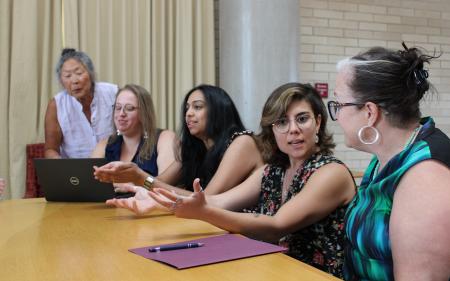Sacramento County Coaching, Training, and Organizational Development Services
In 2023, Butler Institute for Families at the University of Denver Graduate School of Social Work (Butler) was awarded preferred vendor status through the Sacramento County Department of Personnel Services Training and Development. Through this award, Butler provides coaching services, assessments and leadership development training to the Sacramento County workforce.

Butler’s coaching, training and development services are designed to meet the workforce’s diverse and evolving needs. Butler is a national leader in effective workforce and leadership development and is dedicated to partnering with public agencies to identify and address their unique coaching and training needs. Our trainings focus on the whole person and use a variety of delivery methods including a blend of synchronous and asynchronous options.
What our coaches/trainers can do to support your workforce development:
- Provide one-on-one coaching, including executive leadership coaching
- Meet with agency leadership and staff to explore challenges and opportunities and design effective and holistic training solutions
- Access and tailor training resources through strong partnerships across the nation that support leadership development
- Leverage extensive experience providing virtual and in-person training as well as instructor-led and self-paced training
- Conduct group coaching sessions for teams to support projects and team-building
- Provide certificates of attendance for completion of training
- And much more!

To discuss any of the options below in more detail or to simply learn more, please contact us!
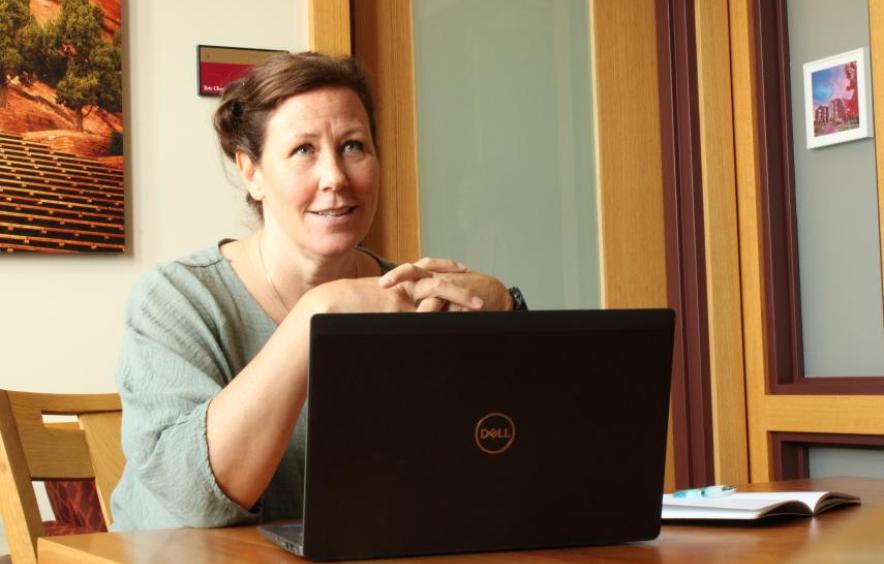
Coaching Services
Butler’s coaching philosophy is grounded in a developmental coaching approach. Developmental coaching considers the whole person – the mindsets, values, assumptions and beliefs that drive our behaviors. It brings awareness to and aligns these core aspects of a person to support their intended behavior changes. This approach evokes the uniqueness of each person and focuses on their potential. To watch a short video about developmental coaching, please watch our video on developmental coaching.
-
Developmental Coaching Approach
Developmental coaching can challenge dominant cultural norms around busyness by valuing people’s states of “being” as well as “doing.” In developmental coaching, we encourage our clients to pause and reflect on their motivations and desired outcomes and then take thoughtful and intentional action. This approach leverages the neuroscience that explains how humans learn and develop by integrating connections between new ways of thinking and approaching a subject with attempts at new behaviors and actions.
Developmental coaching is different than “performance coaching,” which is what we likely imagine when we think of a sports coach or technical coach who focuses on our actions and technical challenges. As developmental coaches, we leverage our client’s own wisdom, resourcefulness and creativity. A developmental coaching approach honors clients’ diversity and encourages inclusiveness. Because developmental coaches explore awareness of their own cultural backgrounds and assumptions, they can approach a person holistically, creating space for them to define their motivations and desired outcomes. This enables us to provide a coaching experience that meets our clients on their terms and emphasizes their unique and powerful ways of being and doing in the world. In today’s workforce, individuals bring their whole selves to work – developmental coaching is effective because it takes the entire person into account.
All Butler’s coaches are certified coaches trained through an International Coaching Federation accredited program and grounded in Butler’s developmental coaching model.
-
One-on-One Coaching
One-on-one coaching sessions, including executive coaching, are scheduled to meet the client’s goals – most often this is every other week or once a month. One-on-one coaching sessions are conducted virtually through Zoom or Teams platforms. Butler’s one-on-one coaching process includes:
- An initial session, called a discovery session, where the coach and client explore the client’s values and coaching goals.
- Subsequent sessions focused on increasing awareness and evoking transformation toward the client’s desired goals through powerful questions, deep listening and imagining possibilities and tying them to the client’s values.
- “Homework” to help the client move toward their desired goals.
- A final session in which the coach and client reflect on accomplishments and plan for the client’s future growth.
- Schedule your one-on-one coaching sessions today and learn how coaching can help you reach your goals! You may also reach out to schedule a 10-minute “meet and greet” conversation to help you get to know our coaches and decide who will be a good fit for you.
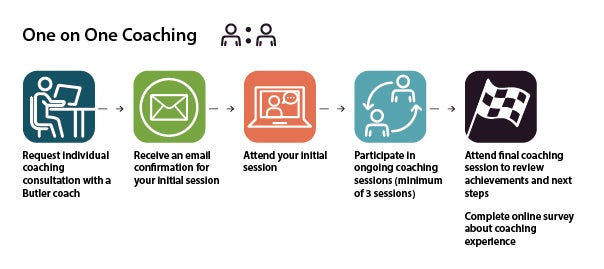
-
Group Coaching
Group coaching brings the coaching conversation into a small group context to support shared learning. We cultivate an inclusive conversation focused on group goal setting, deepening group members’ awareness around key issues, taking action and accountability. Group coaching sessions are facilitated virtually, through the Zoom or Teams platform.
Examples of group coaching:
- A role-focused coaching group to help facilitate role development (i.e., become a more confident leader). This type of coaching group tends to be ongoing, meeting at regularly scheduled intervals.
- A topic-focused group (e.g., managing conflict). This type of coaching group is typically time-limited and meets at regularly scheduled intervals (e.g., 6 weeks).
- A specific team/unit-focused group typically established to strengthen team/unit dynamics. This type of coaching group tends to be time-limited.
Email us at butlercoaching@du.edu to schedule a consultation with a Butler coach today to start designing your group coaching cohort.
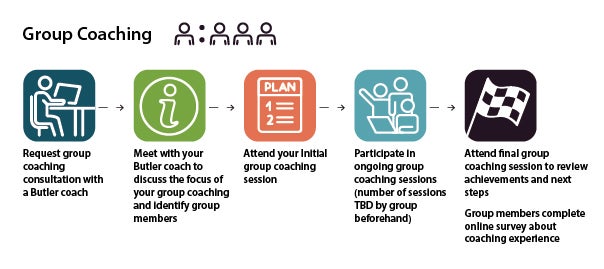
-
Assessments
Assessment tools in the professional development and coaching context help people understand and discover information about themselves. We use these tools to help clients look inward and reflect, which often leads to more clarity and meaningful goal development.
We offer the option of using the following assessment tools – you can integrate them into your coaching or use them as standalone information-gathering resources:
- 360˚ Assessment: A tool for professionals to reflect and document their perceptions of their own leadership skills and compare these to ratings from others in their organizations, including managers, colleagues and direct reports. 360˚ assessments can be powerful tools for improving leadership and organizational performance. We have conducted 360˚ assessments with over 100 organizational leaders across the country, in conjunction with leadership training and coaching, to support skills development and transfer of learning. Butler will offer 360˚ assessments to Sacramento County leaders to identify areas of strengths and leadership gaps and develop a plan for professional development (Center for Creative Leadership, 2023). 360˚ assessments are not intended to measure performance but rather as a tool to support developmental coaching.
- Myers-Briggs Personality Type Indicator (MBTI®): The MBTI is an awareness raising tool that helps individuals recognize their natural preferences related to their work environment, taking in and processing new information and making decisions. The MBTI can be utilized in coaching when an individual wants a better understanding of themselves to identify goals and outcomes. Butler’s licensed MBTI practitioner has over 10 years of experience administering the assessment (The Myers & Briggs Foundation, 2023).
- Clifton Strengths® Assessment (formerly the Clifton StrengthsFinder®): This assessment helps individuals discover what they naturally do best and learn how to develop their greatest talents into strengths. The online survey provides personalized results and reports to maximize their potential. Together with their Butler coach, the individual explores how best to put these results into action (Gallup, 2023). Butler coaches utilize the Clifton Strengths® Assessment to explore how clients’ strengths show up, areas they need to pay attention to that may be more challenging and how to interact with those around them to create a strengths-based team.
- Intercultural Development Inventory® (IDI®): The IDI assesses intercultural competence—the capability to shift cultural perspective and appropriately adapt behavior to cultural differences and commonalities. Organizations and individuals most often use the IDI to advance diversity and inclusion goals and outcomes (Intercultural Development Inventory, 2023). Butler has seven IDI Qualified Administrators and has utilized this tool to support individuals and groups in their goals of working successfully across and within cultural differences.
Assessment requests can be made directly through your coach, however, if you’d like to schedule a standalone assessment (i.e., outside the context of one-on-one or group coaching), email us at butlercoaching@du.edu, and one of our coaches will contact you.
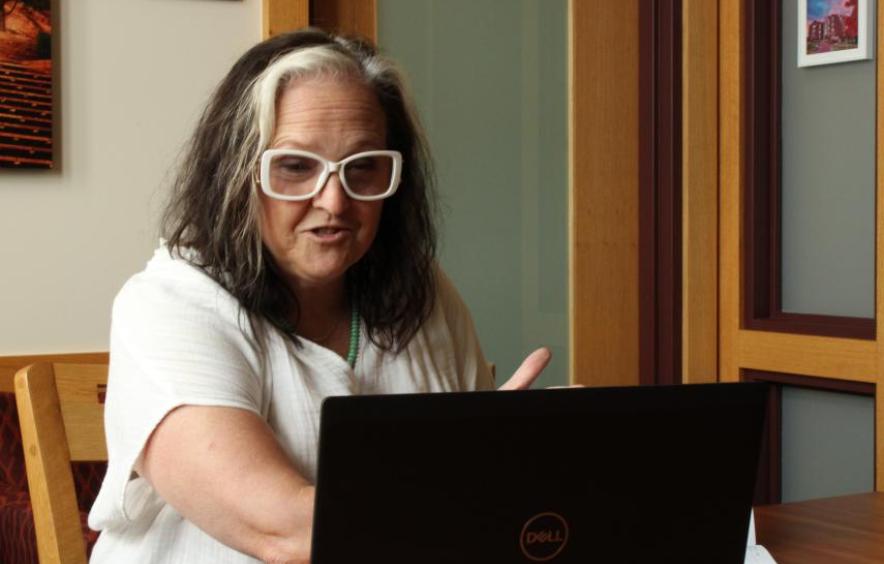
Training and Organizational Development Services
Our experienced trainers are skilled in many modalities, such as online learning, virtual training delivery, in-person training and hybrid approaches that maximize participants’ learning. Butler has deep expertise in these approaches and several trainers on the team.
When we provide live virtual training, we use video platforms such as Zoom, and one or more trainers facilitate, which allows all learners to participate at the same time. Virtual live trainings utilize various engagement tools such as live polling, breakout group discussions, and virtual chalkboards so facilitators and participants can share information about training concepts and lessons.
To discuss any of the options below in more detail or to simply learn more, please email us at butlercoaching@du.edu!
-
Leadership Academy
Adapted from the National Child Welfare Workforce Institute’s Leadership Academy for Child Welfare Leaders (Academy), Butler is excited to offer the Leadership Academy to Sacramento County agencies. The Leadership Academy is geared toward leaders across different sectors, including early childhood, education, Temporary Assistance for Needy Families Program, behavioral health, and more. It builds essential skills for managing change, leading people, leading for results, building strong collaboratives by leading in context, and developing organizational cultures of racial equity, safety, and learning. Butler certified coaches provide individualized and peer-group coaching for leaders in the program, and evaluation support is included to ensure competency gains and transfer of learning.
The Leadership Academy is typically offered over nine to 12 months and consists of five learning modules that include:
- Fundamentals of Leadership
- Leading Change
- Leading in Context
- Leading for Results
- Leading People
Each module includes:
- An asynchronous online learning component
- A synchronous experiential learning session that Butler coaches can deliver in-person or virtually
Participants engage in online pre-learning instruction, optional assessments, and individual one-on-one leadership coaching from certified Butler coaches.
The Academy also includes 360° feedback assessments aligned with the Leadership Competency Framework. This framework is informed by best-practice leadership literature across public and private sectors.
The Leadership Academy can be customized to meet your agency’s needs and interests regarding format, duration, content and more. Data indicates the Academy successfully advances participants’ leadership competencies by increasing their knowledge, skills and abilities.
-
Trauma-Informed Leadership
Organizational leaders are increasingly recognizing the importance of trauma-informed leadership. Effective leaders must be able to create organizational cultures and climates that prevent and address organizational trauma and secondary traumatic stress (STS).
Organizational trauma can occur when distressing or disturbing events happen within a workplace or when there are other conditions that cause employees to feel:
- A lack of trust in their leaders or colleagues
- Physically or emotionally unsafe
- Insecure in their jobs
STS can happen when individuals are exposed to the traumatic experiences of other people, usually their clients’, and develop symptoms of post-traumatic stress disorder. STS is a major contributor to turnover in the helping professions, and turnover contributes to workforce shortages, which affects the ability of systems to respond to the service population’s needs.
Organizational leaders must be equipped to address their organization’s and workforce’s needs and to stay attuned to stress and trauma that can impact their workforce.
Butler offers a variety of trainings on trauma-informed leadership including Reflective & Trauma-Informed Supervision and Transformational Leadership.
-
Foundations of Youth Engagement for Leaders
Engaging youth leadership in a meaningful way requires organizations to create environments that are supportive of youth and build the capacity of adults to partner with youth, while also equipping youth with the knowledge and resources they need to fully participate. Building on the concepts of positive youth development, Butler offers training to develop the capacity of adults working alongside and supporting young people, including:
- The core elements and principles of engaging youth in leadership opportunities
- Supporting developmental opportunities for young people
- Reciprocal benefits for organizations and the potential for partners and communities to have more meaningful impact by engaging youth voice
-
Foundations of Community Partnership for Leaders
Equitable, inclusive and sustained impact requires organizations to engage in community involvement and ownership, which they can achieve through authentic partnership with the communities they aim to serve, especially the most historically marginalized or oppressed communities. Butler’s training focuses on the importance of community partnership and the role agency leaders have in creating an organizational environment that values and supports authentic partnership principles. These principles include:
- Identifying the reasons for and type of engagement for meaningful partnership
- Building trust and accountability with the identified community
- Becoming aware of the community’s social context, including historical oppression, and addressing power differentials
- Using equitable approaches to information gathering, co-creation and decision-making
- Establishing pathways for sustained partnership and reciprocity
-
Coaching Skill Development
Coaching is an essential skill for leaders to support staff and organizational change. Organizations that incorporate coaching skills into their management culture show increased organizational commitment, job competency and belonging and an improved learning environment (Park et al., 2021). Coaching also increases people’s self-efficacy, hope, optimism, well-being, self-regulation and endurance (Theeboom, 2016; Burt, 2017; Novitasari, 2021).
Butler offers a variety of trainings that help leaders integrate coaching skills and approaches into their roles (all trainings adhere to the International Coaching Federation competencies):
- Fundamentals of Coaching – A 2-day virtual experience covering the basics of coaching. The in-person training is followed by three months of virtual learning circles to support transfer of learning. Learning circles foster peer/colleague-to-peer/colleague learning to spark and develop innovation, reinforce critical thinking and improve practice.
- Foundations of Coaching – A 12-week virtual learning experience with prework, live learning sessions, try-it exercises and practice groups to introduce foundational coaching skills and explore ways to incorporate them into participants’ leadership style and work context.
- Academy of Professional Coaching – A 7-day, 3-module deep dive into developmental coaching and how to utilize coaching skills in your leadership practice, accredited through the International Coaching Federation. In Butler’s developmental coaching model, the coach assists the client in developing skills while deepening their thinking and understanding about who they are as an individual in the context of their skill development. The Academy of Professional Coaching builds knowledge and skills acquisition at every step of the coaching process.
